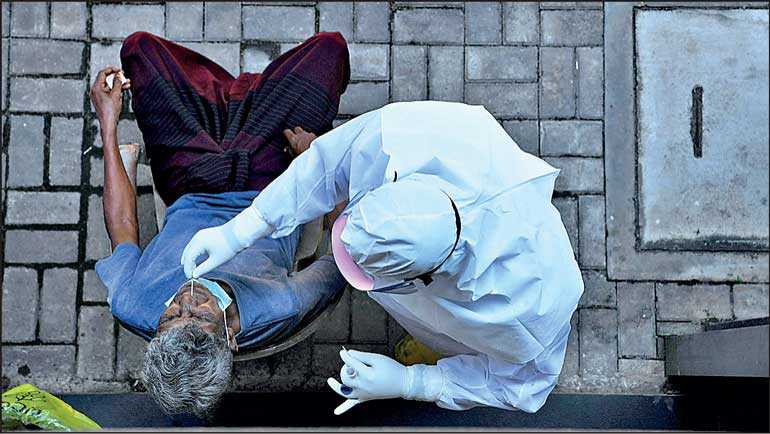Thursday Feb 19, 2026
Thursday Feb 19, 2026
Friday, 7 May 2021 00:00 - - {{hitsCtrl.values.hits}}

Proposals for increasing PCR testing, requesting more beds, oxygen, ICU facilities are immediate necessities to meet the chaos that is being heaped on society, but is no answer to the accelerated spread – Pic by Shehan Gunasekara
By Kusal Perera
As we all know, we are into a severe crisis with the third wave of this COVID-19 spread that has now affected all districts and Colombo listed as the worst. For over one year, COVID-19 has brought very serious breakdowns in social lives and on the already crumbling economy.
Fatalities have now reached over 700 from 604 since Sinhala-Tamil New Year. Month of May began with a further increase and the daily number recorded was 1,923 on 3 May. We need a complete change in approach for too many reasons.
It was predicted with Sinhala-Tamil New Year shopping and festivities this outbreak could be far worse than the two previous outbreaks. Neglect of social responsibility was clearly in show with the urban affluent flocking to Nuwara-Eliya for holiday fun and the religious Sinhala Buddhists trekking Sri Pada for worshiping. There were also State functions openly violating health guidelines for prevention with ruling party leaders as chief guests. Blame for the rapid spread of COVID-19 virus nevertheless was on the ordinary people. They remain the lot who are arrested for violations.
Let me stress, the present Colombo-centric approach with preventive guidelines slapped on society as ‘Orders’ decided and announced by the ‘Task Force on COVID-19 Control’ and often enforced by the Police has created an unnecessary gap between ‘people’ and ‘prevention’. Lack of trust in enforcement agencies has prevented some from providing information and even avoiding treatment.
Since the first outbreak in March was announced as over in May 2020, Colombo high command approach could not keep the COVID-19 spread under control, despite blaming people. Thus, over the past nine months we were into two new outbreaks without any definite plan, each more severe in extent and in impact to the one before.
Reopening and closing of both public and private schools during the past year have been erratic to say the least, ruining the future of over 4.5 million students. Education has become intolerably chaotic with totally alien “online teaching” dumped on students and teachers without any pre planning and preparations. So are universities and higher education institutes.
In the formal economic sector, factory workers are insecure with employers wanting to maximise profits using COVID-19 pandemic crisis to reduce numbers in their workforce too. Added is neglect of establishing preventive measures in factories by employers. In Katunayake, Koggala FTZs and in other places, factories face closure with fair numbers of workers often tested and reported as positive. There are instances where villagers had demanded closure of factories.
Rural economy is dragged on for survival. Most Sunday fairs have lost their vendors and customers, with less transport available. Produce collectors do not come to villages as before and cashflows have shrunk.
Rapidly increasing positive and fatality numbers have brought heavy pressure on all hospital staff and a scarcity on essential human and material resources. Need for increased numbers of beds, ventilators, oxygen and ICU facilities have created more uncertainty in society. They also create a new demand for more special trained nurses and technical staff. On the sidelines, there is confusion over vaccination programs continuing.
COVID-19 prevention is not about accommodating increasing numbers of COVID-19 cases for hospitalised treatment. It is about seriously reducing infections in society.
We therefore need to shift to a ‘Community based COVID-19 Preventive Program’ made public immediately. A program that will be carried out by local field healthcare workers, under the MOH and the MOH Office established as the ‘Local COVID-19 Preventive Unit’.
For a community-based preventive healthcare program the Public Health Inspectors (PHI) and the Family Health Service Officers (FHSO – decades ago Midwives) are two extremely important and indispensable field health workers, who should be given total responsibility in COVID-19 preventive work along with the Grama Niladhari (GN) of the division. People know them in their work areas. It is important for people to trust officers who come to them, to provide all required information.
The total community-based preventive healthcare program should be accompanied by a detailed working program designed by few very selective community healthcare experts, with PHIs and FHSOs represented through their trade unions. The policy plan I propose should include:
1. MOH offices to be established as ‘COVID-19 Preventive Units’ under the MOH, with PHIs and FHOs given responsibility to monitor all households in their respective areas (roughly about 1,000 to 1,500) supported by the GNs.
2. All field staff in MOH offices and GNs should be provided with PPE, masks, face covers and necessary resources immediately.
3. A Special Duty Allowance (SDA) not less than Rs. 5,000 should be given as incentive for strenuous all day work and health risk.
4. Socio-economic life in the district should be regulated and monitored under the District Secretary, supported by Divisional Secretaries and all MOH in the district.
5. Special plan should be included for reopening of schools during the next six months beginning 1 June and maintenance of safe public commuting, with special attention given to public employees including teachers.
6. Employers should be instructed to immediately arrange for PCR testing of all factory employees and provide transport for their factory employees within districts.
7. District Secretariat should update and maintain a district data-base made available as open source for all citizens.
This in short is a proposal for a clear plan that should be made public immediately. Proposals for increasing PCR testing, requesting more beds, oxygen, ICU facilities are immediate necessities to meet the chaos that is being heaped on society, but is no answer to the accelerated spread.
(The writer is a journalist, political commentator and social activist.)